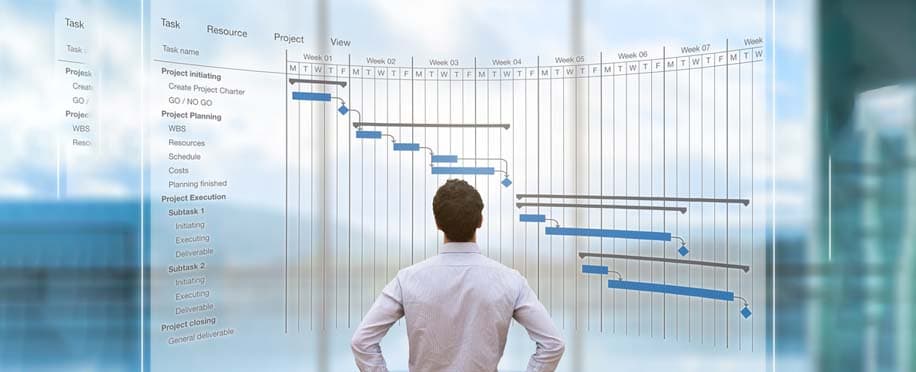Copyright © 2026 lpcentre.com All Rights Reserved. London Premier Centre For Training Ltd Registered in England and Wales, Company Number: 13694538
version: 3.0.1

Posted on : 8/5/2022, 8:06:21 PM
Last Update : 12/19/2023, 5:53:50 PM
Project Management is leading a team through the various project management phases to achieve a specific goal.
Project management phases consist of 5 distinct phases: initiating, planning, executing, monitoring, controlling, and closing. So, In this article, we'll take a closer look at each of these phases and how they can help you get your business started.
In each of these five project management phases, you can achieve great results for your project and control it to launch practical project ideas. So here are the most critical project management phases to manage or establish the project from its beginning to its end.

Phase 1: Initiating
The project initiation phase is the first stage of turning an abstract idea into a meaningful goal. This can be done through organising ideas, planning the study, implementing and planning processes, setting the tasks of each phase with its phase, and the feasibility of each plan. The Minimum Viable Product (MVP) is created and tested.
Also, this phase is when you present your project to the investors and participants and give them an initial picture of it. The goal is to enable you to create correct management from the start by breaking down the main processes and ideas of the project.
Here you will also assess the target audience, competitive analysis, manage tasks, determine what skills you need and who will perform them, customise your promotion tools, monitor project performance, and create and analyse the necessary budget.
Phase 2: Planning
The planning is a detailed map of what you will work on in this project, and the goal of this map is to see the complete picture of the project easily without any complications, which will make you think further.
Practical and valuable ideas always arise when planning projects that were not considered. Thus planning makes you think in a better way to manage your project because then you will see the final evaluation that determines whether you need other things or not.
Or even if you have added essential things in your mind but do not need them, you can dispense with them and move on with the project faster.
Not to mention, you will know if there are redundant or deficient resources in the project.
This part, in particular, needs constant modification and updating according to the goal and project management plan that is being made, so it happens that the primary phases or classifications that include some part of this project have not been organised correctly and, therefore, at this phase, they need to be updated.
Also, in the planning phase, diagrams, tables of contents, timelines, and applications based on mental maps help you to know how to accomplish the planning processes in the easiest way when you follow these steps of the stages in each project.
Phase 3: Executing
It is the phase in which the idea manager begins implementing the project plan by distributing the work to the team and for the project manager to keep abreast of all the details and the latest developments at each stage.
And here comes the task of managing the right tasks, where you have to resort to everything that helps you manage projects while developing them correctly and ensuring that these five project steps are high quality.
Also, at this phase, you have to know and analyse the required budget, as this is the essential step to achieve matters related to implementation. Then, start achievements and analyse whether there are resulting or expected risks when starting the project steps.
Phase 4: Controlling
When you start planning the project, you must follow its implementation processes in a tight organisational way, and it is already under your control as a manager, so at this point, you have to control and check every type of idea that has been implemented.
For example, to check whether the construction of the project is going with the required quality, to follow up on whether the project schedule is going according to plan, and whether the specified budget is also being spent correctly, as well as permanent documentation with the preparation of schedules and data.
There are also many other ways to know or monitor your data and have the project in control of all these five project management phases, for example, by scheduling meetings and requesting reports constantly to manage projects more effectively.
In addition to monitoring the effective management responsible for the project management phases. You must pay attention to continuous development and risk management to ensure the project is in control.
Phase 5: Closing
The closing phase helps you review what was accomplished at the end of the project and is here as a knowledgeable guide to look at the results in your project management phases. You can obtain approval at this stage if you are not the project owner.
Here, It's okay to hear some criticism or ideas you should have done at some point in the project.
It is worth noting that the most important thing to do during the project management phases is to document the difficulties you face and what lessons you learned to manage future projects better.
The answer is yes, no matter what project you are working on, you always need these 5 project management phases through which you will have a successful project, whether it is a start-up project or not.
In conclusion,
We invite you to attend Project Management Training Courses in London that will properly introduce you to the project management phases and the difference between its uses to progress and prepare for your projects.